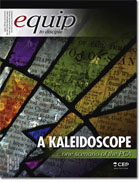 Do you think that the General Assembly should have answered Overture 9 in the affirmative and established a committee to study the issue of women’s involvement in diaconal ministry and report back to the 37th General Assembly?
Do you think that the General Assembly should have answered Overture 9 in the affirmative and established a committee to study the issue of women’s involvement in diaconal ministry and report back to the 37th General Assembly?
The 36th General Assembly, after many hours of committee and floor debate, answered Overture 9 in the negative, declining to establish a study committee. This action was taken in spite of a minority report that attempted to persuade the assembly to answer in the affirmative. As the coordinator of Christian Education and Publications, under whose oversight the Women in the Church is positioned in the PCA, a number of people have asked my opinion on the issue.
As I sat on the second row of the assembly listening to the debate, several things came to mind that I believe should or could have been stated, which I picked up on when responding to those who later asked. This is an issue that if changed would require several constitutional changes, and there are ways to do that. Also, let me make it clear that the issue of women’s ordination, when finally allowed in the mainline Presbyterian Church, was one of the top issues which led to the forming of the PCA.
As I respond, be aware that I do so we a ring at least two hats. The first is not only as one of the organizers of the PCA in 1973, but also as the chairman of the original Constitutional Documents Committee. It was my responsibility, working with Dr. Morton Smith, Dr. Frank Barker, and the late Don Patterson to develop and present the Book of Church Order (BOCO), stating the PCA’s polity to the assembly. The BOCO had three parts. My responsibility was to read each section verbatim before the entire first three assemblies. I had to explain why the BOCO stated things as it did. This took many hours on the floor, including discussion and debate at times.
Read entire publication in PDF (Acrobat Reader Required)
One of the positions taken by the PCA at its inception was that ordination to office, elder or deacon, was for men only. Remember this was one of the major issues which led to the forming of the PCA, but also understand why.
After a number of years studying and debating this issue, the mainline church decided under the protest of a minority to allow women to be ordained to those offices. Though the more conservative arm of the church opposed such a position, it must be realized that much study by many scholars was reflected in that action. Those who finally formed the PCA simply believed it was not the teaching of Scripture. Therefore, to suggest that the present position of the BOCO does not reflect in depth study is inaccurate. One of the main problems revolves around the PCA’s present position reflected in the BOCO of positing authority in the office of deacon. Therefore, the first issue that would need to be solved is this: Is the office of deacon an authority office or only a service office? The present ordination vows in the BOCOare identical to that of the elders in asking the congregation if they would submit to the authority of the elders/deacons.
When the PCA became a particular denomination in December 1973,it did not do so without a history. The PCA was the result of a movement called the Continuing Presbyterian Church, a reference to the early Presbyterian Church in the United States before liberalism and neo-orthodox theology took control. Among the men who formed this southern church in 1861 was James Henry Thornwell. As a matter of fact, as you read the PCA’s original address to all churches adopted by the first assembly, it was called pristinely “Thornwellian.” What did that mean? The PCA was to be a “grassroots” church and not a top down church. The main court in the Presbyterian system is the presbytery. This had two main effects, especially as we developed the BOCO. First, being a grassroots church, we left as many issues to the local churches and presbyteries as we possibly could. For example, the BOCO did not address the issue of rotation of officers, a debated issue in our beginning. Nor did it address the issue of women teaching mixed adults or what form or forms should be used in worship, to name a few. We attempted to allow as much freedom and control to sessions and presbyteries as was deemed necessary.
This was a somewhat different approach than practiced by the northern mainline church that then followed the polity of Charles Hodge. The Reformed Presbyterian Church Evangelical Synod that joined the PCA in 1982 also tended to follow the Hodge polity. How this played out was reflected in a conversation in 1974 with a good friend and brother from the RPCES. He said, “It appears to me the PCA’s approach is not to address issues unless they come to the General Assembly as an appeal from the lower courts. We on the other hand tend to deal with issues and write position papers at the Assembly level prior to such appeal. “He basically reflected the difference in the PCA. The PCA has had many study committees and adopted many position papers but only after the lower courts appealed to the assembly for help in determining issues. Following the “Thornwellian” procedure, the PCA has not been quick to establish study committees.
Understanding the PCA’s organizing principles helps to explain why questions troubling the church which the local courts have not been able to conclude are appealed to General Assembly; and if enough concern is there, the General Assembly usually appoints a study committee. Overture 9, if studied and enacted, would require several constitutional changes; and it has not been the PCA’s method of procedure to change the BOCOby a study committee.
I was further asked, “Does the PCA need to study this issue of the possible ordination of women deacons?” I now put on my second hat and respond as the CEP Coordinator, which includes the Women in the Church. When the PCA was formed, the mainline church from which we left had a very significant women’s ministry. The PCA, in attempting to follow Scripture, wanted to continue the vital ministry of women. It was placed under the oversight of CEP for two reasons. Its focus was two fold- spiritual growth and assisting the officers in carrying out mercy ministry, which by the way, the PCA sees as closely related to diaconal ministry. During my years as coordinator of CEP, we have intentionally focused on those two founding points. God has done some fantastic things through the gifted women in the PCA. We have held local church and presbytery training conferences. Finally, we have conducted several strategically important denominational conferences focusing on both spiritual growth and mercy ministries. Those conferences have actually moved the PCA forward in the principle and practice of mercy ministries. For example, it was the gathering of 4,000 women in 1999 in Atlanta under the banner of mercy ministry that encouraged CEP and Mission to North America’s biannual mercy ministries conferences. Women have been key players in those conferences. Several of our women sit as advisory members on a number of the assembly ‘s committees and agencies.
Over the years with our CEP ministries, we have chosen to focus our energies on the function of ministry and not the form . We have attempted to encourage local churches and presbyteries to have that focus. As a result, the PCA is stronger in its theology and practice. Under the oversight of CEP, our women’s ministry has chosen not to spend energies on things other than ministry and growth action. The ministry at the assembly level has intentionally focused on training women to minister to women, as well as training in assisting elders and deacons in the local church ministry. WIC has been a valuable part of CEP’s ministry from the beginning. Its annual Love Gifts have enabled the committees and agencies to do some outstanding ministries. Their prayers and encouragement have been one of the PCA’s main strengths. As I have met with women across our church, I have not heard or experienced PCA women wanting to do anything but minister and make kingdom disciples.
I conclude my answer with two final thoughts.
One, whether or not a women should or should not be ordained to the office of deacon has not hindered PCA women from being a strategic part of the PCA’s ministry.
Two, written into our BOCO are the procedures to follow when issues relating to the BOCO need to be addressed. Whether or not Overture 9 followed those procedures, I will leave to the judgment of those who dealt in depth with the overture.
As I have stated many times in Equip to Disciple, knowing our history and tradition is vital to dealing with issues that confront us today. This does not keep us from studying and receiving further insight into issues just as we have done in the past. However, some of the things I am presently reading and studying could almost lead me to conclude that there are those who really believe they are the first generation ever to consider this or that issue, when church history is full of those who have done so before us.


 The past two issues of Equip to Disciple have focused on the church and the important role it must continue to play in growing and expanding the kingdom of God. In this particular article, I want to focus your attention on the theme expressed in the title above; the church as a believing community learning to live in communion. As our Westminster Confession of Faith says in 26-1, “All saints that are united to Jesus Christ their head by his Spirit, and by faith, have fellowship with him in his graces, sufferings, death, resurrection, and glory: and, being united to one another in love, they have communion in each other’s gifts and graces.”
The past two issues of Equip to Disciple have focused on the church and the important role it must continue to play in growing and expanding the kingdom of God. In this particular article, I want to focus your attention on the theme expressed in the title above; the church as a believing community learning to live in communion. As our Westminster Confession of Faith says in 26-1, “All saints that are united to Jesus Christ their head by his Spirit, and by faith, have fellowship with him in his graces, sufferings, death, resurrection, and glory: and, being united to one another in love, they have communion in each other’s gifts and graces.”